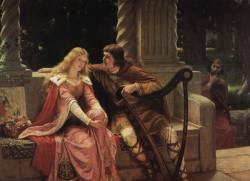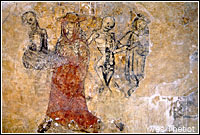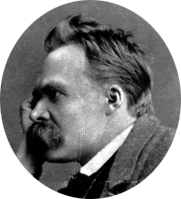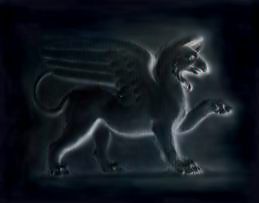Famous Goths in Literature and History

Ok, since who is and isn't goth is somewhat subjective and a label of any sort is by definition somewhat reductive, don't mail me and tell me that you disagree with this or that choice unless you have some intelligent and well-reasoned explanations for your opinions, and feel free to write and suggest people for inclusion. Also, some of these names were chosen with a sense of humour--so to all those who get mad about this, *stop taking yourself too seriously.* You'll have a stroke before your 40, and no one will give you a wake.
Goths in Literature
This section contains fictional characters, not authors. For the sake of this listing, writergoths are classified under "historical personage" since they actually existed. Clear? Good.

Tristan and Iseult
The tragic love of the Irish priestess/princess and the Cornish prince was likely the Celtic origin of the Guinevere/Lancelot story. Tristan dies for love of the absent (and married) Iseult, and Iseult dies of sorrow at the news. Tragic and theatrical, the soul of goth.
Titania and Oberon
The Queen and King of the Faeries, popularized by Shakespeare's A Midsummer Night's Dream. They swing from perky to mopey to sarky goth and back again, depending upon the tale you are reading at the time. A little bit of romaniticism, a little bit of faery dust mixed with a healthy dose of cruel trickery and there you have it.
Hamlet
I mean, really, he walks around pretending to be insane, wearing all black, and talking to a skull (which answers him...). What says "goth" more than that?
Catherine and Heathcliffe of Wuthering Heights
They died for love, one of them gets to be a ghost and haunt the other, and their love story is one of the most tragic, and violent, in the history of literature.

Goths in History

Saint Cecilia
As the patron saint of music, that might be enough to qualify her. But Cecilia, born into a noble Roman family in the 3rd century AD, was married against her will to a conventional sort of chap (read: mundane) who didn't like her preoccupation with death and spirituality. Because she made a row with male authroity types and refused to do what she was told on the religious front, she was condemned to be suffocated and boiled to death in her own bath. Though the water was heated to several times normal, she emerged unscathed and was eventually beheaded. The headsman needed three tries to fatally wound her, and she bled to death, singing all the while.

Guyot Marchant
A woodcut-maker and artist from Paris who created the earliest extent artistic version of the Danse Macabre and lived in the middle of the plague years of Europe. His woodcuts, along with their explanatory verses, are assumed to be an interpretation of the earliest known example of the Danse Macabre, a series of paintings on the walls of the cemetary of Les Innocents in Paris. Only fragments of the original remain, the whole having been destroyed by a fire during 1669.
William Blake
Blake, poet and mystic, wrote Songs of Innocence and Experience, a collection of poems meant to explore the
heights and depths of what experience/sin or innocence/simplicity meant. His work stimulated the creation
of a tarot deck specifically designed to explore the creative mind. The so-called grandfather of the Romantic Age, Blake studied the darkness inherent in the human soul and created his own religious/spiritual system before he wrote many of his greatest poems.
George Gordon, Lord Byron
I've never met a little goth boi quite as angst-ridden as Byron who loved being that way quite so much. He wrote poems to skulls that he used as drinking glasses which he dug up from the cemetary *himself*, he died fighting a losing battle in a war for Greece's independence (because he loved the Classics), and he wore ruffled shirts and talked about how miserable life was. Yes, he was pretentious, but who else could earn the appelation "mad, bad, and dangerous to know"? Don't you wish *you* could...

Friedrich Niezsche
He wrote about the angst of modern life. He wrote about joy and beauty and art and was interested in everything from religion to psychology. Nothing was more important to him than destruction (natural entropy or induced) or what you could make of it. His philosophy shaped generations to come, including our own.

Any Random French Existentialist
I recommend Simone de Beauvior (perky, romantigoff) particularly because she was more aware of her own pretention and actually saw some light at the end of the tunnel of modern life. Her friends Albert Camus and Jean-Paul Sartre, however, were mopey-goths before there *were* mopeygoths. Have you read Camus? Particularly The Stranger, an anthem to being considered a freak (and actually being one...)? Camus wrote that the only serious question was whether or not to kill yourself...Sartre wrote that you may as well do it, if you can summon the energy. de Beauvoir just rolled her eyes and told them to get
over it.
William Butler Yeats
Irish revolutionary, poet, and playwriting, Yeats was
dramatic, stylish, and willing to die for the woman he loved. He loved death, decay, faeries, and occultism, rising to some prominance in the Fraternal Order of the Golden Dawn, the Kabbalistic organization which shows up quite frequently in his later works.


Return to GothniCity
Return to Main Index page









